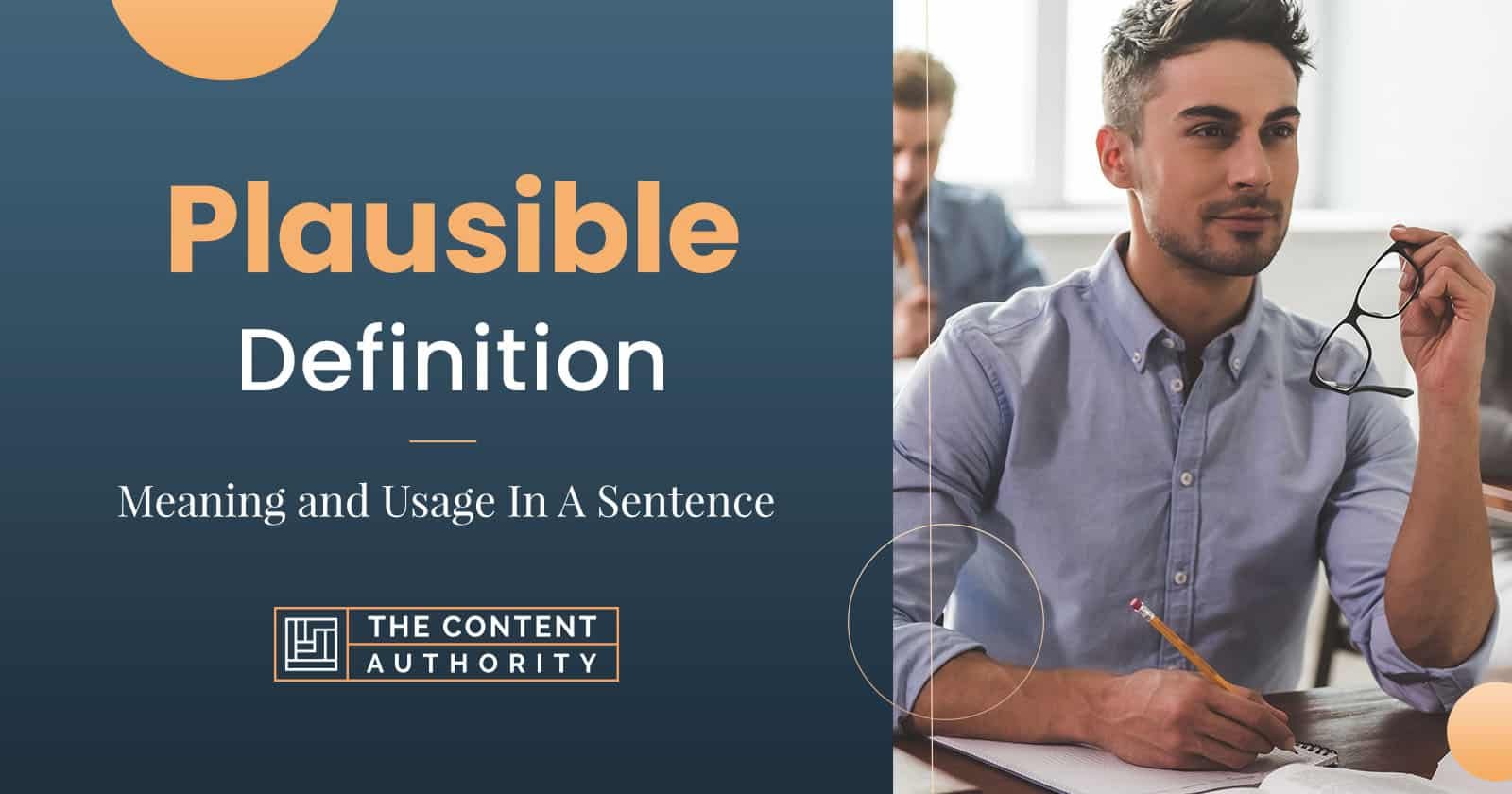Did you know that not everything believable is true? Some statements, promises, excuses, and explanations are “plausible,” which means they have the appearance of truth or are within reason. Are you ready for a detailed description of plausible definition and usage?
The word “plausible” is an adjective that means “appearing worthy of belief.” An assumption most people make about the word is that it means something true. But that is not always the case; use “plausible” when referring to anything that has an appearance of reason, truth, or credibility.
Replace the word “believable” in your statement with “plausible.” Use the word when describing anything that seems worthy of belief, even if it is not factual. The article will further elaborate on the word “plausible” so you can better understand this vocabulary.

What Is the Definition of Plausible?
“Plausible” (adjective) means superficially fair, reasonable, valuable but often spacious. Use the word plausible when talking about immense arguments. People have to argue often based on their differences in ideas. You can also use it to show that something is lacking sincerity.
Example sentences:
- It is an urban myth that scares me because it is plausible for it to come true.
- David has a plausible argument on how we can reset the system without losing any data.
- Thanks to technology, it is plausible for long-distance learning to offer quality education to the students.
What Is the Meaning of Plausible?
“Plausible” means superficially pleasing or persuasive. Use the word “plausible” when discussing something persuasive and intriguing, especially when meant to deceive.
Example sentences:
- Every suggestion that was brought forward seemed plausible and interesting.
- Though the reasoning might seem plausible, it will not affect the jury since they have already made up their minds.
- He tested all the plausible theories until he developed an invasion that would help everyone in his village.
Synonyms and Antonyms, and Rhyming Words of Plausible
Synonyms
Are you searching for a list of words with similar meanings to “plausible”? Here is a list you can use?
- Believable
- Credible
- Reasonable
- Persuasive
- Probable
- Likely
- Possible
- Tenable
- Convincing
- Valid
Antonyms of the Word Plausible
Do you want to know words that are the opposite of “plausible?” Here is a list of words you can use.
- Improbable
- Unsound
- Senseless
- Absurd
- Unreasoned
- Silly
- Blunt
- Genuine
- Arrogant
- Quiet
Words That Rhyme with Plausible
If you are searching for words that rhyme with plausible, here are some words to consider.
- Susceptible
- Possible
- Sensible
- Bubble
- Example
- Compatible
- Feasible
- Triple
- Middle
- People
Words Phrase with the Word Plausible
- Plausible alternative: Apparent, trustworthy, or believable.
- Plausible claim: A statement or an explanation that seems valid.
- Plausible deniability: Mainly in the people in the chain of command refusing knowledge, responsibility, or claim.
- Plausible reason: An explanation that seems believable.
- Plausible scenario: A realistic event that could disrupt a vital business service or delivery.
- Plausible theory: A method of deriving new conclusions from known premises
How to Use Plausible in a Sentence
When creating sentences with the word “plausible,” use the word to show a person’s skill to produce persuasive arguments. The intention of creating plausible sentences or information is mainly to deceive. Though it can be positive, the word plausible is mostly negative as it shows some sense of deceit.
Words Derived From Plausible
Plausibility (noun): The quality of seeming reasonable or probable.
Example sentences:
- It is essential to be aware of the plausibility of the sales representatives.
- The plausibility of success depends on the number of soldiers and type of weapons.
- The promise to do better lacks plausibility.
Plausibly (adverb): Easy to believe based on the available evidence.
Example sentences:
- It is important to build a strong case, so there is no room for plausibly deniable statements.
- I tried to find any form of offense from Mrs. Peter’s speech that could plausibly be attributed to the violent way that her husband reacted.
- The only way the team could plausibly win the game is if their quarter-back made a miraculous recovery.
Plausibleness (noun): The state or quality of being plausible.
Example sentences:
- There is plausibleness in the plot to rob the bank.
- Despite the plausibleness of becoming rich in the future, the application’s creator sold it at a throwaway price.
Comparing Plausible with Other Words
- Plausible vs. possible: Though plausible and possible are synonyms, they have different meanings. “Plausible” means seemingly reasonable or probable, while possible means can be done within the power or capacity of someone or something.
- Plausible vs. feasible: Most people use plausible and feasible interchangeably; it is important to learn the difference between these two words so you can use them correctly. Plausible means possibly true, feasible means possible to do.
10 Examples of Plausible in a Sentence
Are you uncertain about how to use the word plausible in your sentences? Here are ten sentence examples to help you get started.
- A plausible explanation was that the person who left the office last forgot to lock up.
- Everyone said Mary was lying, but the explanation she offered seemed plausible to me.
- After the plausible loss he caused the company, he could not wait to get paid.
- His stories were so plausible that he ended up conning everyone in his village.
- It does not matter what happened; as long as you give a plausible explanation, they will let you off the hook.
- As a company, we need a plausible speaker who will speak on our behalf and ensure that the public sympathizes with us.
- The thesis research you did had plausible findings, and the evidence to support your work is convincing.
- I am trying to find out if there is any other plausible reason for your lateness.
- Everything that you are saying seems plausible. The problem is that you are not telling the whole story.
- His story was plausible, but his kids’ version seemed impossible.
How Do You Spell Plausible?
The spelling of this word is “P.L.A.U.S.I.B.L.E.”
Learn the proper spelling of “plausible” to avoid making a mistake that could lead to the readers not understanding what you are saying.

How Do You Pronounce Plausible?
The correct pronunciation of “plausible” is “plaw.zuh.bl.”
Just as it is important to learn the definition, spelling, and usage of a word, it is also important to learn how to pronounce it.
How Many Syllables Are In Plausible?
“Plausible” has three syllables divided as “plau.si.ble.” The stressed syllable of the word is “plau.”
History & Etymology of Plausible
The history and etymology of the word “plausible” are nothing like you would expect. The word is derived from “plausibilis,” which means worthy of applause. However, when the English language borrowed the word, it meant “reasonable or believable.”
When Was Plausible First Used?
The first known use of the word “plausible” was in 1565.
The first use of “plausible” meant something superficially fair, reasonable, and specious.
Conclusion
“Plausible” describes what might appear true, but it is deceptive. If someone or a thing is described as “plausible,” it strikes the superficial judgment favorable even if it might not be true. In some cases, it can also mean one that cannot be verified or believed completely or deceptive for evil purposes.
You need to ensure you have taken the time to understand the word before constructing sentences. You can do this by sharing when you come across the word and anything about it that intrigues you. If possible, share with your colleagues where you first came across the word and the best possible applications of the word “plausible.”
Shawn Manaher is the founder and CEO of The Content Authority. He’s one part content manager, one part writing ninja organizer, and two parts leader of top content creators. You don’t even want to know what he calls pancakes.

